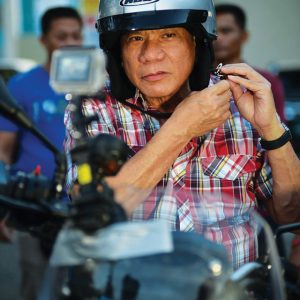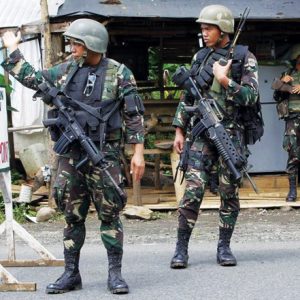If you are doing an illegal activity in my city, if you are a criminal or part of a syndicate that preys on the innocent people of the city, for as long as I am the mayor, you are a legitimate target of assassination.”
Mayor Rodrigo ‘Rody’ Duterte
Davao is not your typical Southeast Asian city. The air is clear and the pace relaxed. The Philippines’ customary – and customised – SUVs, motorbikes and iconic jeepneys queue calmly on the roads, freezing at crossings and edging slowly off the mark when the light goes green. Pedestrians stroll patiently on spotless pavements. Nobody in sight smokes or drinks due to an outdoor ban on these vices. After dark there is little nightlife in Davao, and all bars and liquor stores shut at 1am.

Such an orderly way of life has much to do with the stringent governance of the current mayor of Davao, Rodrigo S. Duterte, commonly known as Rody. His most controversial policy is what some call a “zero tolerance approach to crime”. Others, particularly human rights activists, prefer to term it an “endorsement of summary executions”.
From time to time, the peace and quiet of Davao City is disrupted by groups of men in baseball caps pulling over on motorbikes and stabbing or shooting a known criminal, often a drug dealer or juvenile recidivist. According to Amnesty International, about 1,000 people have been executed in this fashion since 2001, when Duterte came to power.
While “The Punisher”, as he’s been dubbed by Time magazine, denies any personal responsibility for these murders, Duterte’s public remarks make it clear as a bullet to the head where he stands on what is known as the Davao Death Squad. On his weekly TV show he told any lawbreaker watching: “You will not survive; you can leave either vertically or horizontally.” To the Philippine Inquirer he said: “Criminals have no place in the city, except in gaols, detention centres and, God forbid, in funeral parlours.” When questioned about an infamous rice smuggler, Duterte answered in homage to film director Sam Peckinpah: “Just bring me the head of Ryan Yu.” The local press have nicknamed him ‘Duterte Harry’.
However, Kenneth Roth, executive director of Human Rights Watch, alleges that Duterte’s administration goes further than mere verbal threats – policemen and government functionaries are thought to train and arm death squad members, help them compile hit lists and tip them off as to the whereabouts of the target. The killers act with relative impunity thanks to a lackadaisical and complicit police force, as well as witnesses who are too terrified to testify, according to Roth.
So how does Duterte – a former human rights lawyer no less – get away with advocating the extrajudicial killing of his own constituents, some of them no older than 14? One answer is his broad popularity.
Luis H. Francia, adjunct professor of Asian American studies at Hunter College, New York, met Duterte in the early 1990s. “A lot of Filipinos like Rody’s charisma and they believe he brought down the murder rate,” he said. “People see him the way that, say, Wyatt Earp [a wild west lawman] would have been seen in Tombstone, Arizona.”
Moreover, Duterte’s fans span the political spectrum: from arch-conservative senators in Manila to Jose Maria Sison, the exiled leader of the communist New People’s Army. Duterte is also a shrewd politico, winning over those liberals and leftists who object to his stance on crime with other, more progressive social and environmental policies. In defiance of big business, he has banned mining across Davao City, “because it destroys our land and our forests”, and has created initiatives to modestly improve the health, education and social mobility of Davao’s poorest inhabitants.
Equally crucial is that many locals are inclined to agree with Duterte because they see a certain logic in vigilantism. The use of guns to settle disputes and vendettas is not uncommon in the Philippines, a nation where 3.9 million citizens own firearms and that ranks 25th in the world for per capita shooting crimes. Mistrust of the official justice system – blighted as it is by abuse, corruption and ineptitude – is pervasive. The law-abiding poor suffer the most from unchecked criminality and some are grateful for what Rudy Encabo, head of Davao’s Public Safety and Security Command Centre, called “the rest-in-peace solution”.
Alfredo P. Torreo, a Davao taxi driver who works 48-hour shifts to support his family of seven, recalls the evening he got home to find that the gang who’d been terrorising his slum neighbourhood was no more. “One day they were there trying to sell drugs to my kids and beating up my friends, and the next [they were] gone,” he said. “It was a big, big relief for me to have this problem no longer.”
The question remains whether Davao’s extreme form of violent ‘justice’ simply engenders more violence. Encabo argued that the death squad has made Davao the most peaceful city in the archipelago. “We have had very low crime rates for the duration of the mayor’s terms of office,” he said. “Davao is surrounded by the troubled areas of Mindanao so it is critical that we keep our city safe for our people and for tourism.”

Kenneth Roth’s findings, however, are quite different. “Contrary to expectations, the Davao Death Squad has not reduced crime,” he wrote in the Far Eastern Economic Review. “In the decade since [the squad] began operating, crime in Davao City has mushroomed ten times faster than the population.”
There is also a stench of hypocrisy about Davao’s ruling officials – who the local media accuse of misappropriation of public money, pork barrel scams and downright theft – engineering the deaths of penniless and powerless individuals who hold up 7-Elevens and pickpocket tourists.
As Red Constantino of the human rights group International Accountability Project puts it: “People who applaud extrajudicial responses to crime are the same people who will demand due process when it is their turn to feel the state’s boot on their neck.”
Whatever the impact of the death squad on Davao, crime will endure until the conditions of the most disadvantaged are radically improved and those on both sides of the law toe the same line.
“Real toughness can be found not in the person with the unholstered sidearm,” said Constantino, “but among officers and citizens determined to end the culture of impunity with the comprehensive, consistent application of the rule of law.”
Keep reading:
“No particular place to go” – The future is uncertain for the thousands left displaced by the violent conflict in Mindanao, where the local government is accused of using them as pawns in a divisive political game


